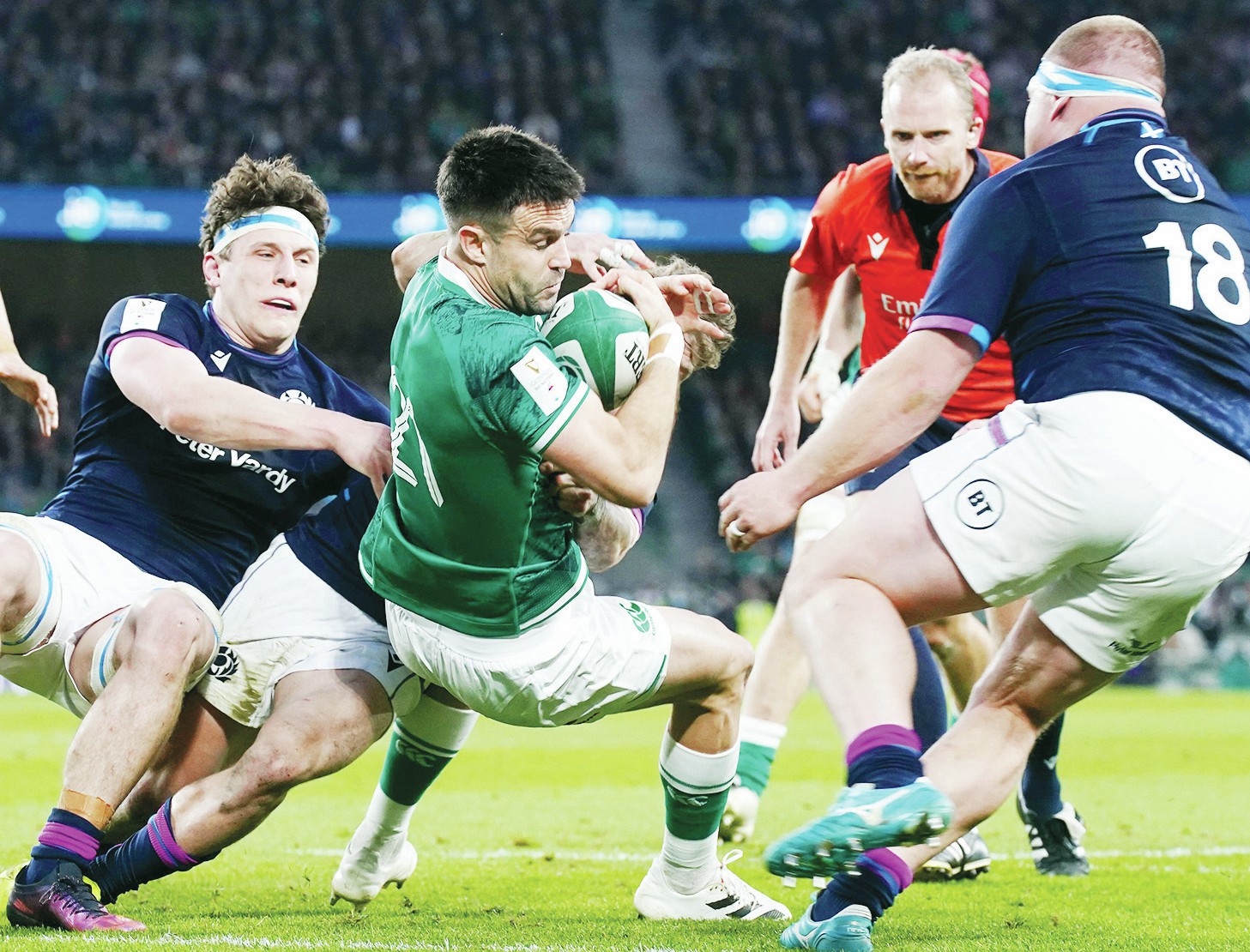Paris set for Celtic clash of titans

The rugby world will be transfixed for 80 minutes on Saturday night as world number one team Ireland face Scotland in a winner takes all clash to decide Pool B.
Ireland, world champions South Africa, and number five Scotland will all learn their knockout fates on Saturday 8pm when Andy Farrell’s generational side go to battle with Gregor Townsend‘s attacking pioneers in the Stade de France.
There is everything to gain and everything to lose. For Ireland, avoiding defeat secures them top spot and a chance to finally end their quarterfinal hoodoo. For Scotland, a bonus point win, or a win that prevents Ireland from getting one, will be enough to secure qualification having missed out to Ireland last World Cup. For South Africa, Ireland losing by more than 21 points but with a bonus point will see them become the first defending champions to exit at the pool stage.
The job sounds simple for Scotland: beat Ireland by eight points and you knockout one of the top two seeds. However, Ireland are unbeaten in 16 matches and since 2017 against Scotland, with the Emerald Isle’s only loss to the Scots by eight points or more in the last 22 years being meaningless 2007 World Cup warm-up.
As an indication of the match’s white hot heat, both sides have gone all out in their selection despite the prospect of a quarterfinal less than seven days later. Ireland, who might feel more comfortable taking this liberty having just had a bye-week, have made just four changes to the squad that crushed South Africa two weeks ago.
Scotland’s team is of course much changed from the one that swatted aside Romania last week, but the starting XV that coughed and spluttered to an 18-3 loss to South Africa in week one has only one change and represents both coaches’ prioritisation of experience: British and Irish Lion Ali Price starts, with Ben White removed altogether as George Horne’s bench impact is preferred.
Elsewhere, the starting XV is unchanged. Scotland’s flamboyant backline is again headed by Finn Russell. Darcy Graham’s electric performance against Romania sees him silence any doubters of his first team spot, whilst a backrow of Jamie Ritchie, Rory Darge and Jack Dempsey will have their work cut out by Ireland’s formidable dynamism in that area.
Aside from George Horne, Scotland’s bench is much changed to the one that failed to fire a shot in the second half against South Africa. Representing Townsend’s diagnosis of what went wrong as they painfully succumbed to South Africa’s steel, Townsend has transitioned to a 6-2 bench.
Back row Luke Crosbie is the additional forward, but with just six caps to his name represents what could be a fundamental difference between the two sides: experience.
In the heated moments experience is telling, and the Scotland bench that will close out the game has 209 caps, 60 of which belong to 37-year-old WP Nel who has struggled in the tournament so far.
On the other hand, Andy Farrell has persisted in his unflinching faith in the 5-3 split. Boasting 341 caps, it is an overwhelming point of difference. Even the most inexperienced head of them all, Jack Crowley, has shown a knack for clutch moments with his URC semi-final winning drop kick against Leinster and calm slotting of a penalty to steer Ireland clear of South Africa.
Nonetheless, Farrell has sought out more experience with British Lion back rower Jack Conan replacing the young Ryan Baird. Former captain James Ryan, as perhaps the only unexpected change, drops to the bench as 77-cap Iain Henderson joins tournament standout Tadhg Beirne in the engine room. This could also be Farrell seeking to make his game airtight with the only discernible flaw in Ireland’s tournament so far being a slightly inconsistent lineout.
Dan Sheehan starts at hooker at the first possible opportunity post-injury, with his throwing perhaps preferred to Ronan Kelleher whose success rate of 75% so far is below the standard expected of Ireland nowadays.
The line-ups are full of fascinating head-to-heads. Not least between the two fly-halves, both talismanic symbols of Townsend and Farrell’s contrasting gameplans. Finn Russell and Jonny Sexton have come to define how either side, and maybe even rugby as a whole, has been played in the world cup cycle leading into this tournament. Expect fireworks as the two planets collide.
The line-ups are full of fascinating head-to-heads. Not least between the two fly-halves, both talismanic symbols of Townsend and Farrell’s contrasting gameplans.
Finn Russell and Jonny Sexton have come to define how either side, and maybe even rugby as a whole, has been played in the world cup cycle leading into this tournament. Expect fireworks as the two planets collide.
Townsend and Russell, having failed in 2019 and so miserably against South Africa, face a do or die challenge for their very outlooks on the game. They must upset Ireland’s golden generation and send shockwaves through the sporting world.
Will they forget their South African anti-climax and live up to the occasion? Will Ireland become best team to ever exit the group stage in perhaps any sport, or will they reaffirm their status as favourites? It’s all to play for.
IRELAND: Keenan, M Hansen, Ringrose, Aki, Lowe, Sexton (c), Gibson-Park; Porter, Sheehan, Furlong, Beirne, Henderson, O’Mahony, Van der Flier, Doris.
Replacements: Kelleher, Kilcoyne, Bealham, Ryan, Conan, Murray, Crowley, McCloskey
SCOTLAND: Kinghorn, Graham, Jones, Tuipulotu, van der Merwe, Russell, Price; Schoeman, Turner, Z Fagerson, Gray, Gilchrist, Ritchie (c), Darge, Dempsey.
Replacements: Asham, Sutherland, Nel, Cummings M Fagerson, Crosbie, Horne, Smith.
For exclusive stories and all the detailed rugby news you need, subscribe to The Rugby Paper website, digital edition, or newspaper from as little as 14p a day.